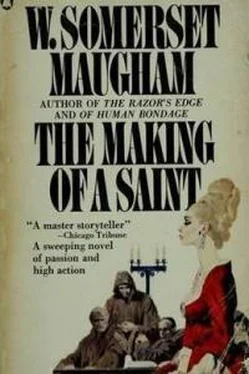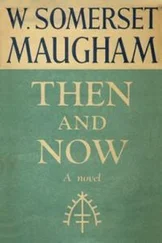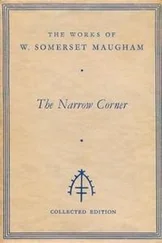The Making of a Saint
A Romance of Mediaeval Italy
W. Somerset Maugham
Quanto e bella giovinezza,
Che si fugge tuttavia;
Chi vuol esser lieto, sia,
Di doman non c'e certezza.
Youth—how beautiful is youth!
But, alas, elusive ever!
Let him be light of heart who would be so,
For there's no surety in the morrow.
These are the memoirs of the Beato Giuliano, brother of the Order of St Francis of Assisi, known in his worldly life as Filippo Brandolini; of which family I, Giulo Brandolini, am the last descendant. On the death of Fra Giuliano the manuscript was given to his nephew Leonello, on whom the estates devolved; and has since been handed down from father to son, as the relic of a member of the family whose piety and good works still shed lustre on the name of Brandolini.
It is perhaps necessary to explain how the resolution to give these memoirs to the world has eventually been arrived at. For my part, I should have allowed them to remain among the other papers of the family; but my wife wished otherwise. When she deserted her home in the New World to become the Countess Brandolini, she was very naturally interested at finding among my ancestors a man who had distinguished himself in good works, so as to be granted by the Pope the title of Beatus, which was acquired for him by the influence of his great–nephew not very long after his death; and, indeed, had our house retained the prosperity which it enjoyed during the fifteenth and sixteenth centuries, he would undoubtedly have been canonised, for it was a well certified fact that the necessary miracles had been performed by his remains and that prayers had been regularly offered at his tomb, but our estates had dwindled, so that we could not afford the necessary expenditure; and now, when my wife has restored its ancient magnificence to our house, times, alas! have changed. The good old customs of our fathers have fallen into disuse, and it is impossible to create a saint for ready money. However, my wife desired to publish an account of her pious ancestor. But a difficulty arose in the fact that there were no materials whatever for any relation of the life which Fra Giuliano led when he had entered the Franciscan monastery of Campomassa, and it was obvious that, even if there had been good works, prayer and fasting could not have afforded a very interesting story; and so we have been constrained to leave untold his pieties and recount instead his sins, for which there was every facility in the memoirs he had himself left behind him.
Not content with writing the story of his own life, Fra Giuliano begins with a mythical Consul of the Roman Republic, who is supposed to have founded the family by a somewhat discreditable union with somebody else's wife. He then carries the story through countless ages till he arrives at his own conception, and the prodigies attending his birth, which he describes with great minuteness. He gives very amply the history of his childhood and boyhood, the period he spent as page at the Court of the Bentivogli of Bologna, and his adventures in the Neapolitan armies under the Duke of Calabria; but the whole story is narrated at such length, with so many digressions and details, and is sometimes so vague, incoherent and disjointed that, with whatever editing, it was considered impossible to make a clear and continuous narrative.
Fra Giuliano himself divided his life into two parts: the one he named the Time of Honey, being the period of expectation; the other the Time of Gall, being that of realisation. The second half commences with his arrival at the town of Forli, in the year 1488, and it is this part which we have decided to publish; for, notwithstanding its brevity, this was the most eventful period of his life, and the account of it seems to hang together in a sufficiently lucid fashion, centring round the conspiracy which resulted in the assassination of Girolamo Riario, and finishing with the author's admission to the Order of St Francis. This, then, I have given exactly as he wrote it, neither adding nor suppressing a word. I do not deny that it would have pleased me a little to falsify the history, for the Anglo–Saxons are a race of idealists, as is shown in all their dealing, international and commercial; and truth they have always found a little ugly. I have a friend who lately wrote a story of the London poor, and his critics were properly disgusted because his characters dropped their aitches and often used bad language, and did not behave as elegantly as might be expected from the example they were continually receiving from their betters; while some of his readers were shocked to find that people existed in this world who did not possess the delicacy and refinement which they felt palpitating in their own bosoms. The author forgot that Truth is a naked lady, and that nudity is always shameful, unless it points a moral. If Truth has taken up her abode at the bottom of a well, it is clearly because she is conscious that she is no fit companion for decent people.
I am painfully aware that the persons of this drama were not actuated by the moral sentiments, which they might have acquired by education at a really good English public school, but one may find excuse for them in the recollection that their deeds took place four hundred years ago, and that they were not wretched paupers, but persons of the very highest rank. If they sinned, they sinned elegantly, and much may be forgiven to people whose pedigree is above suspicion. And the writer, as if unwilling to wound the susceptibilities of his readers, has taken care to hurl contempt at the only character whose family was distinctly not respectable.
Before making my bow, and leaving the reader with Filippo Brandolini, I will describe his appearance, shown in a portrait painted in the same year, 1488, and till the beginning of this century in the possession of my family, when it was sold, with many other works of art, to travellers in Italy. My wife has succeeded in buying back the portraits of several of my ancestors, but this particular one is in the collection of an English nobleman, who has refused to part with it, though kindly allowing a copy to be made, which now hangs in the place formerly occupied by the original.
It represents a middle–sized man, slim and graceful, with a small black beard and moustache; an oval face, olive coloured, and from his fine dark eyes he is looking straight out into the world with an expression of complete happiness. It was painted soon after his marriage. He is dressed in the costume of the period, and holds a roll of parchment in his hand. At the top right hand corner are the date and the arms of the family; or a griffin rampant. Gules. Crest: a demiswan issuing from a coronet. The motto: Felicitas .
'Allow me to present to you my friend Filippo Brandolini, a gentleman of Città di Castello.'
Then, turning to me, Matteo added, 'This is my cousin, Checco d'Orsi.'
Checco d'Orsi smiled and bowed.
'Messer Brandolini,' he said, 'I am most pleased to make your acquaintance; you are more than welcome to my house.'
'You are very kind,' I replied; 'Matteo has told me much of your hospitality.'
Checco bowed courteously, and asked his cousin, 'You have just arrived, Matteo?'
'We arrived early this morning. I wished to come here directly, but Filippo, who suffers from a very insufferable vanity, insisted on going to an inn and spending a couple of hours in the adornment of his person.'
'How did you employ those hours, Matteo?' asked Checco, looking rather questioningly at his cousin's dress and smiling.
Читать дальше











